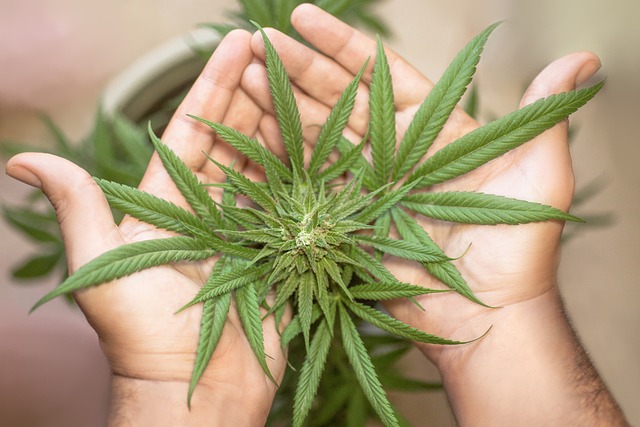THCA, the non-psychoactive precursor to THC, is gaining attention for its potential health benefits and is currently in a legal gray area in Texas. Despite the complexity of cannabis legislation, raw cannabis containing THCA is legally accessible under specific conditions within the state. Texas's unique stance on THCA arises from a technicality differentiating it from psychoactive THC, despite the broader medical cannabis program with strict limitations. Consumers interested in the therapeutic properties of THCA, such as its anti-inflammatory and neuroprotective effects, must navigate this nuanced legal environment to ensure compliance with state laws. As THCA is not explicitly defined within Texas's legal frameworks, it's crucial for users to understand the precise sourcing and composition of their products to avoid legal complications. With legislative changes continually shaping cannabis legality, staying informed about the evolving status of THCA in Texas remains essential for anyone considering its use for wellness applications.
Discover the multifaceted wellness benefits of THCA flower, a non-psychoactive compound found in cannabis that’s gaining attention for its therapeutic properties. In this article, we delve into the legal landscape of THCA in Texas and its burgeoning status within state laws. From its relationship with THC to its potential roles in neuroprotection, cancer research, and as a natural remedy for inflammation, pain, and mental health conditions, our comprehensive guide explores the myriad ways THCA flower can be integrated into a holistic wellness routine. Understanding how to safely incorporate it into your daily life and staying informed on the latest legal trends and scientific advancements will empower you to make knowledgeable choices about this promising plant compound.
- Unlocking THCA Flower Benefits: A Comprehensive Guide
- THCA Legal Status in Texas: Navigating the Laws
- What is THCA? Understanding Its Relationship to THC
- The Therapeutic Properties of Raw Cannabis: Insights into THCA
Unlocking THCA Flower Benefits: A Comprehensive Guide

Discerning consumers and curious enthusiasts alike are increasingly turning their attention to THCA flower, a form of cannabis that holds significant promise for its therapeutic properties. Tetrahydrocannabinolic acid (THCA) is the raw, non-psychoactive precursor to the well-known compound THC, found in hemp and marijuana plants. As such, THCA flower benefits are drawing attention for their potential health and wellness applications. In states where cannabis regulations are clarified, including Texas where certain forms of THCA-rich hemp are legal under specific conditions, the exploration of THCA’s advantages is becoming a focus of both scientific research and anecdotal reports. Preliminary studies suggest that THCA may offer anti-inflammatory, neuroprotective, and analgesic effects, making it a subject of interest for those seeking natural alternatives to manage pain, inflammation, and various neurological conditions. Understanding the nuances of THCA’s legal status is crucial for consumers interested in exploring its potential benefits, especially within the context of Texas’s evolving cannabis laws. It’s important to stay informed on local regulations to ensure compliance with state laws when considering the use of THCA flower for its myriad of potential health advantages.
THCA Legal Status in Texas: Navigating the Laws

In the context of Texas’ regulatory framework, understanding the legal status of THCA (Tetrahydrocannabinolic Acid) is crucial for those interested in its potential benefits. As of the current legal landscape, THCA, which is non-psychoactive and found in raw cannabis plants, is technically legal in Texas due to a loophole that distinguishes it from its psychoactive counterpart, THC (Tetrahydrocannabinol). The Texas Compassionate Use Program allows for the use of low-THC cannabis for medical purposes under strict guidelines. This program was expanded in 2019 to include THCA, provided it is derived from hemp and contains less than 0.3% delta-9-THC. It’s important for consumers to source THCA products that comply with state and federal regulations, as the legal status can be nuanced when it comes to various forms of cannabis-related compounds. The distinction between THCA and THC is significant, given the different regulatory approaches to each. Users in Texas should be mindful of the precise composition and origin of their THCA products to remain within the bounds of the law while exploring the potential wellness benefits associated with this compound. Navigating the laws can be complex, as they are subject to change and may vary by local jurisdiction; thus, individuals must stay informed on the evolving legislative landscape to ensure compliance.
What is THCA? Understanding Its Relationship to THC

Delta-9-tetrahydrocannabinolic acid, commonly known as THCA, is a natural cannabinoid found in the Cannabis sativa plant. Unlike its well-known counterpart, delta-9-tetrahydrocannabinol (THC), THCA remains non-psychoactive until it undergoes heating or decarboxylation processes. This precursor to THC has garnered attention for its potential therapeutic properties, which are being studied for conditions ranging from inflammation to neurodegenerative diseases. THCA’s relationship to THC is significant because it shares a similar molecular structure but lacks the psychoactive effects associated with THC. This distinction is particularly relevant in regions where cannabis laws are evolving, such as Texas, where THCA products may be legally available under certain state regulations. In Texas, where the legal landscape for cannabis-related compounds is complex, THCA flowers and derivatives have emerged as a focus of interest due to their potential benefits and distinct legal status compared to other cannabinoids like THC. As legislation continues to shape the availability and use of these compounds, understanding the nuances between THCA and THC becomes increasingly important for consumers and healthcare providers alike.
The Therapeutic Properties of Raw Cannabis: Insights into THCA

Delta-9-tetrahydrocannabinol (THC) is well-known for its psychoactive effects, but before it transforms into this state through heat, THCA, or tetrahydrocannabinolic acid, exists in raw cannabis. THCA is non-psychoactive and has been the subject of growing interest due to its therapeutic properties. Preliminary research suggests that THCA may offer a range of health benefits, including anti-inflammatory, neuroprotective, and potentially antiemetic effects. These potential benefits are drawing attention from individuals seeking natural remedies for various conditions.
In the context of legality, THCA itself is not explicitly classified in states like Texas, where cannabis laws are evolving. However, raw cannabis is currently legal under certain conditions in Texas. This distinction allows consumers to explore the therapeutic properties of THCA legally, as long as they adhere to the state’s guidelines regarding low-THC cannabis and CBD products. As such, enthusiasts and patients are exploring the potential benefits of THCA flower, which is rich in this cannabinoid acid, as an alternative or complement to other treatments. This exploration is part of a broader scientific and medical inquiry into the full spectrum of cannabinoids’ effects, with THCA being at the forefront due to its promising therapeutic profile.
In conclusion, the burgeoning interest in THCA flower and its potential benefits offers a promising perspective for those intrigued by cannabinoids. As outlined throughout this guide, understanding THCA’s unique properties, its distinct legal standing in Texas under ‘thca legal in Texas’ regulations, and its different effects compared to its decarboxylated form, THC, is crucial for anyone considering incorporating it into their wellness routine. The therapeutic insights highlight the significance of exploring raw cannabis, not only for its medicinal properties but also for its compliance with state laws. As research continues to evolve, so too will our comprehension and utilization of this natural compound.
